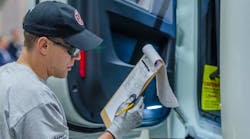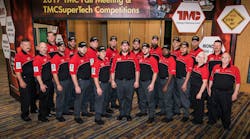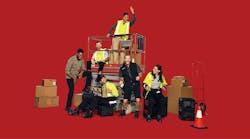The word “assessment” is oftentimes met with a negative reaction. Some relate the word assessment to a test, measurement or accountability, and many companies and organizations don’t want to have their people “assessed.”
However, those same people welcome competitions with open arms and support.
The only difference between the two is one provides a score, and the other includes a stage and awards for participants. Both provide measurable outcomes and information to understand strengths and needs.
Determine training opportunities
As an industry, we have created competitions to recognize technicians and showcase their skills. Whether it’s a state trucking association competition, company-wide competition or the Technology & Maintenance Council’s TMCSuperTech National Technician Skills Competition, each event provides the opportunity for technicians to compete and be rewarded with prizes for their efforts.
Taking a page from motorsports, where teams compile information and data from each race and use that information to increase their knowledge, understanding and ability to be better prepared for the next event and beyond, technician skills competitions offer a similar advantage.
We also take the information and data we scored in each area of a technician skills competition, and provide participants with a score card. Many companies make copies of these score cards and review the results across all of the competing technicians, looking for trends that would provide the organization with an increased understanding of the individuals and collective groups’ strengths and areas which may need improvement.
This allows the leadership to have a better understanding of the potential training needs of not only these participants, but all the technicians in their organization that are still back in the shops.
It is important to know that these competitions are about the tasks and operations technicians would perform in their normal work environment with workstations or individual contest areas covering areas such as lighting, brakes, precision measuring and fasteners, etc.
We build these stations to measure and score each individual step of the process and procedure techs use to complete the objectives of the station. Each step of the process, determined by either the manufacturer or TMC Recommended Practice (RP) procedures, is scored. These competitions are not about trying to trick or create situations that are not common in the industry.
“You don’t know what you don’t know, and these competitions help you gain that experience in a positive environment,” Bryan Lewis, two-time past TMCSuperTech National Champion says. “You need to realize you don’t know everything and take what you have experienced and learn from it.”
“As a technician, the biggest advantage to competing is that you see where your shortcomings are,” Jerry Bodkins, Program Manager at T/A Petro and station chair at TMCSuperTech adds. “That information is then easy to use to focus your own training to better yourself. I did this every year that I competed (in TMCSuperTech).”
“What’s in it for me?”
What do employers, suppliers and others get out of these competitions? The connections and relationships established through skills competitions can be an advantage for not only the competing technician, but also employers and vendors.
“One significant benefit I've seen as a result of local and national technician competitions is the improvement of the relationship between our company and our suppliers, whether that be truck, engine or component manufacturer,” Homer Hogg at T/A Petro says. “In fact, we have seen more training customized to the needs of our technicians resulting in a higher quality of repair in our network.”
It’s important to know that you are not only investing in your company’s important asset, “the technician,” you are also most likely impacting the technicians back at your shops that didn’t get to compete and will now realize that you value them as part of the company.
“Another notable impact is how the technicians that compete on the local and national level come back to their locations and make the entire shop better by passing on the information they’ve gained and encouraging other techs to improve their skill and knowledge,” Hogg says.
Focusing on training needs based on the outcome of these competitions also provides employee retention in some cases.
“We view this as a technician retention measure,” Wally Williams, of WW Williams, says. “Technicians have told us that providing training is one of the reasons they like working here. We treat this as part of a training program. By making the events trips that spouses or family can attend, we also create a rewards program. We promote and celebrate these events to create pride in the workforce and across our locations. Hopefully, the importance we place on the competitions reflects how much we care for and appreciate the hard work our technicians perform daily.”
Conclusion
Technicians want to do a good job and fix equipment right the first time. Skills competitions can provide them with these opportunities across the country, and it’s important to view these opportunities as an investment rather than an expense.
As an industry, the TMC Professional Technician Development Committee (PTDC) and other competition committees have changed the way individuals and companies view and develop training.
They, as well as the suppliers involved, are starting to believe these competitions have made them and their training better.
“Over the years, we’ve been able to gather significant feedback from service technicians participating in these competitions,” says Roger Maye, National Service Manager with ConMet, and TMCSuperTech National Skills Competition station chair since the event was established in 2005. “This has enabled us to refine and improve our training and service materials to provide a more useful learning experience. We’ve learned that segmenting the material into product-specific sections and making it more visually appealing streamlines the learning process for technicians.”
Skills competitions have influenced and changed the perception that technicians are an asset to their company. Competitions, and the subsequent training that follows technician performance at these competitions, are a major piece of that investment.




